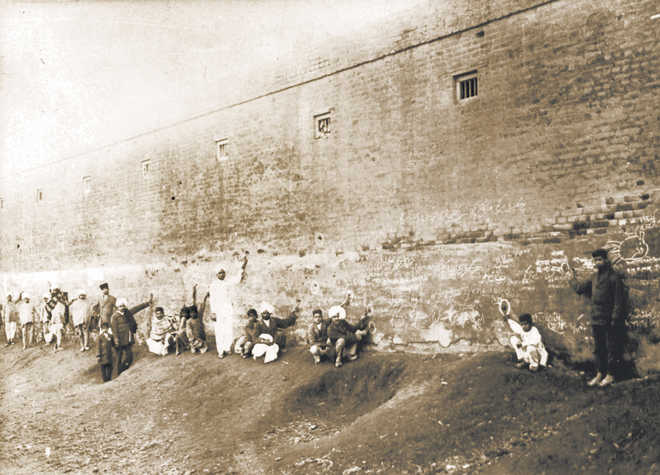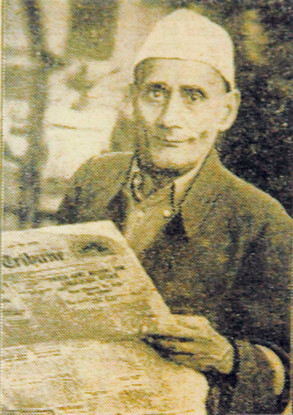April 13, 2019, will mark the centenary of the Jallianwala Bagh massacre, which lit the fire of idealism across the subcontinent, shaping a new nation. As The Tribune launches the centenary special initiative, it remembers the Editor, who moulded the national narrative

Birth of a revolution: In the aftermath of the tragedy, people point out bullet marks in one of the walls of Jallianwala Bagh. The killing of 1,000 peaceful protesters was a moment of awakening. From Tagore to Gandhi, it roused all Indians and turned them into freedom fighters, revolutionaries and even avenging assassins photo Courtesy: Partition Museum, Amritsar

Rajesh Ramachandran
The British had killed and starved millions of Indians while they ruled us, finally leaving us with a parting gift of a million or two dead and 15 million homeless. Yet, no memory of the Indian national movement is more sacred, noble or revered than that of those 1,000 peaceful protesters who were shot down on the Baisakhi day of 1919. From 1857 to 1947, in the long 90-year-old struggle for Indian independence, the small piece of land that was a dumping ground (historian VN Datta has noted that it was never a Bagh or a garden in contemporary accounts) in the holy city of Amritsar became the focal point of Imperial insolence, colonial cruelty and the invader’s injustice. The sacrifice of those idealistic youngsters turned the massacre at Jallianwala Bagh into the source of the soul force for a defeated people in search of a nation.The Butcher of Amritsar, Reginald Dyer, and his boss, the Lieutenant-Governor of Punjab, Michael O’Dwyer, both rabid rulers, personified British brutality, which turned loyal subjects of the British Empire into freedom fighters, revolutionaries and even avenging assassins. That was the moment of awakening. The Anglophile poet and philosopher Rabindranath Tagore returned his knighthood writing to Viceroy Chelmsford in May 1919, “The accounts of the insults and sufferings by our brothers in Punjab have trickled through the gagged silence, reaching every corner of India and the universal agony of indignation roused in the hearts of our people has been ignored by our rulers — possibly congratulating themselves for imparting what they imagine a salutary lesson.”Gandhi was a volunteer, a loyal sergeant major of the Indian Ambulance Corps, helping the British Army in the Boer War and the Zulu War. In 1915 this steadfast servant of the Empire was awarded the Kaiser-i-Hind gold medal for his services to His Majesty. Despite the Champaran and the Kheda Satyagraha, Gandhi was still actively seeking army recruits for the British in the First World War when Rowlatt Bills were introduced. And it is the massacre that made him the Mahatma. It took him longer than Tagore to return the British honours. But when he returned the Kaiser-i-Hind gold medal in August 1920, he had a definitive mission and plan that finally defeated the greatest Empire in modern history.In the Centenary year of the Jallianwala Bagh massacre, as The Tribune remembers that great moment in Indian renaissance, we also remember our Editor, Kalinath Ray, whose writings helped shape the national narrative of the events of 1919. According to a contemporary’s account reproduced in Prakash Ananda’s A History of The Tribune, “Ray was a short man wearing a woollen cap. His coat of Kashmir tweed had shed the greater part of its wool many years ago. It carried many a tell-tale mark of indiscretions resulting from absent-minded handling of fish curry, milk tumbler, rasogullas and dal bhat. His eyes were completely hidden behind thick lenses encased in an iron frame which was being held in position by a cotton thread in at least three places. He was a man of few words.” This shy editor was partially responsible for whipping up the storm that culminated in the mass movement across Punjab and particularly in Amritsar.Ray wrote on March 11, 1919, on the Rowlatt Bills which still had not become law, “There are now two ways open to us. One is that we should, like the dead, put the noose of this law around our necks, bury in oblivion our fair name, as also our great men, and sound the death knell of the so-called liberty of India. The other is that we should afford proof of our life by refusing to accept the law in question.” The Chief Secretary to the Punjab Government was absolutely accurate in identifying The Tribune as “more responsible than any other single agency for the anti-British feeling, and it was on this account that we stopped our advertisements for the paper.” But soon after the massacre, the British government on April 17, arrested Ray for the editorials he wrote, particularly the one titled “Blazing indiscretion”, which exposed ODwyer. Gandhi, the lawyer, was primarily upset over the British abandoning their so-called sense of justice because O’Dwyer had refused to let Ray’s lawyer from Calcutta enter Punjab. Soon Gandhi was writing to all Congress units across the subcontinent to launch a “wide and prompt agitation throughout the country for the release of Babu Kalinath on the grounds of simple justice. I venture to suggest a memorial by local lawyers, a memorial by local editors and resolutions at public meetings for the release of Babu Kalinath Ray to His Excellency, the Viceroy.” He also wrote an article on Ray, The Tribune and the Rowlatt Act in his Young India about the same time. Sure enough, there were protests from Lahore to Erode. Along with Ray, The Tribune trustee Manohar Lal was also arrestedWhile Gandhi was all praise for Ray’s restraint when sowing the wind in Punjab, the greatest youth icon of the Indian national movement, Bhagat Singh, was impatient. He wanted Ray to “put fire into his editorials.” Thus, the story of the Jallianwala Bagh massacre, the national movement and The Tribune are the strands that made this nation’s DNA and The Tribune hopes to celebrate the memories of the martyrs, the massacre’s impact and the building of the nation in this centennial year. This is not a good time to talk about nationalism. On one end of the spectrum are the murderous Hindutva mobs, thirsting for the blood of the neighbour, ignorantly and needlessly crying hoarse, Bharat Mata Ki Jai, the slogan that sought the greatest self-sacrifice. And at the other end are the sophisticated, neo-colonial, forces of religious secessionism funded and promoted by alien agents. To be a Gandhian nationalist was always difficult, more so now.
